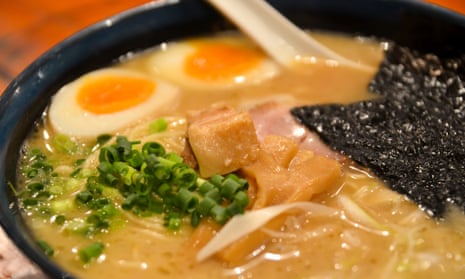This week on the excellent new website of US food magazine Lucky Peach, its founder, the American chef David Chang, bemoans the recent ramen boom. “In Japan, ramen was always a fringe pursuit,” he begins, as if this sustaining dish of noodle soup were thrash metal, say, or parkour. It was “made by outsiders fighting against the mainstream ... food for people that don’t want the same experience”.
Like a character in an early Terrence Malick film, ramen used to wear a scuffed-up leather jacket and slouch around outside the prom. Today, it’s had its teeth done and votes Republican. And Chang feels betrayed, personally affronted, by the umami-rich broth, which has become “the very establishment it once stood against”.
It is the familiar beef of the indie fan whose favourite band licenses one of their songs for a Tampax ad. Ramen has sold out, according to the owner of New York’s wildly successful Momofuku noodle bar; it is too popular, therefore “over”. Time to move on to udon, or ortolans, or whatever.
But he’s not done yet. The internet “has killed innovation”. (He’s having a go at the internet now! What’s next, the birds?). In his day, writes Chang, waving his pipe, ear trumpet gathering dust on a side table, chefs had to cross town on their knees to read menus in restaurant windows to find out what their rivals were up to, wait weeks in the driving rain for the postman to bring books from Japan to learn recipes, and spend six years stoking the fire before they were allowed to even touch the potato peeler. Now, information is available to all!
“There is no more dreaming about food … there is no more thirst for knowledge, no catalyst for imagination or reason to try to create new and different things any more … Everyone’s serving pork,” laments Chang, all irony having apparently deserted him.
So have we achieved peak ramen? Is it all downhill from here? No, of course we haven’t. Ramen is cheap, it’s incredibly delicious, it offers infinite possibilities within a confined space, and there is still so, so much more we in the west have to learn from the Japanese about it. Was ramen ever the rebellious outsider hellbent on bringing down the burger hegemony? That’s stretching it. Since it’s genesis in the 1950s, ramen has offered Japanese people on lower incomes a sustaining meal in a bowl.
Does it matter that Chang, who leapt to fame when he opened a ramen restaurant (or, rather, “borrowed” ramen and made it his “own narrative”, as he puts it, which is an entirely different thing from what other non-Japanese ramen chefs are doing), is now complaining that others have jumped aboard the bandwagon? Not greatly, but it is a little odd.
True, ramen in New York or London might not be as varied and as dazzling as in Japan, but it will get there, or thereabouts, eventually. And it will do so thanks in part to the exchange of ideas and innovation facilitated by that dratted internet thing. Just wait until Londoners get to taste a properly fishy ramen soup! Makes your hair stand on end, it does. As the LA Times’s fast-food hound, Jonathan Gold, writes in another piece about ramen on Lucky Peach’s website: “I don’t see ramen going away any time soon.”
Is there too much tonkotsu about? Has the internet undermined the creativity of chefs? Can having dinner ever be an act of rebellion?
- Michael Booth’s Sushi and Beyond: What the Japanese Know About Cooking is out now (Vintage, £7.99)

Comments (…)
Sign in or create your Guardian account to join the discussion